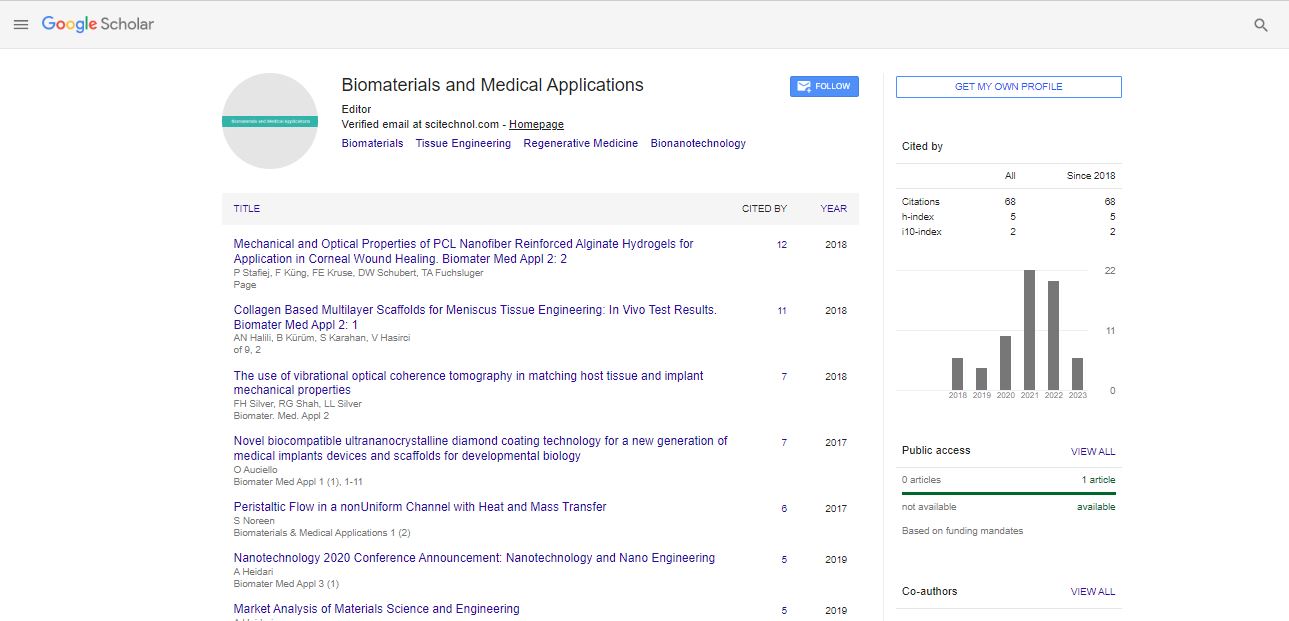Commentary, Biomater Med App Vol: 7 Issue: 3
Cell-Based Therapies for Tissue Repair and Regeneration
Mei Ling*
1Department of Biomaterials, Nanotechnology and Tissue Engineering, Isfahan University of Medical Sciences, Isfahan, Iran
*Corresponding Author: Mei Ling,
Department of Biomaterials, Nanotechnology
and Tissue Engineering, Isfahan University of Medical Sciences, Isfahan , Iran
E-mail: mei.ling@123.sat.ir
Received date: 28 August, 2023, Manuscript No. BMA-23-116225;
Editor assigned date: 30 August, 2023, PreQC No. BMA-23-116225 (PQ);
Reviewed date: 13 September, 2023, QC No. BMA-23-116225;
Revised date: 21 September, 2023, Manuscript No. BMA-23-116225 (R);
Published date: 29 September, 2023, DOI: 10.35248/2577-0268.100531
Citation: Ling M (2023) Cell-Based Therapies for Tissue Repair and Regeneration. Biomater Med App 7:3.
Description
In the realm of modern medicine, cell-based therapies have emerged as a revolutionary approach to tissue repair and regeneration. Harnessing the inherent power of our own cells to heal and rejuvenate damaged or degenerated tissues, these therapies offer new hope to individuals suffering from a wide range of medical conditions. From orthopedic injuries to heart disease, cell-based therapies are transforming the way one can approach healthcare and are poised to redefine the future of medicine.
The promise of regenerative medicine
Regenerative medicine, as a field, holds the promise of not just treating the symptoms of diseases but actually restoring the body to a state of health. Traditional medical approaches often focus on managing symptoms or replacing damaged tissues with artificial materials. In contrast, cell-based therapies aim to stimulate the body's natural healing mechanisms, promoting the regeneration of functional tissues.
Stem Cells: At the core of many cell-based therapies are stem cells remarkable cells with the unique ability to develop into various specialized cell types in the body. There are different sources of stem cells, including embryonic stem cells, induced Pluripotent Stem Cells (iPSCs), and adult stem cells. These cells can be directed to differentiate into specific cell types, making them highly versatile tools for tissue repair.
Orthopedic repair and beyond
One of the most notable applications of cell-based therapies is in orthopedics, where they are changing the landscape of joint and musculoskeletal repair. Conditions such as osteoarthritis, ligament injuries, and cartilage damage have long presented challenges in terms of effective treatment. Traditional approaches often provide temporary relief, but they do not address the underlying cause or promote true tissue regeneration.
In orthopedic cell-based therapies, stem cells, particularly Mesenchymal Stem Cells (MSCs), are employed to stimulate the regeneration of cartilage, bone, and other joint tissues. These therapies have shown promise in not only alleviating pain but also restoring function and reducing the need for invasive surgeries like joint replacements.
Cardiovascular healing
Heart disease is another area where cell-based therapies are making significant strides. Myocardial infarctions, or heart attacks, can lead to irreversible damage to cardiac tissue. However, by delivering stem cells or cardiac progenitor cells to the injured area, investigators are seeking to repair damaged heart muscle and improve cardiac function. These therapies offer the potential to reduce the risk of heart failure and improve the quality of life for patients.
Neurological restoration
In the realm of neurological disorders and injuries, cell-based therapies hold immense promise. Conditions such as spinal cord injuries and neurodegenerative diseases have long presented therapeutic challenges due to the limited regenerative capacity of the nervous system. However, stem cell-based approaches, including the use of neural stem cells and iPSCs, are being explored to promote nerve regeneration and functional recovery.
Skin and wound healing
Cell-based therapies are also finding applications in wound healing and dermatology. For example, in cases of severe burns, where traditional treatments may have limited efficacy, therapies involving the application of skin stem cells can promote the regeneration of healthy skin tissue. Similarly, in chronic wounds, cell-based approaches can accelerate the healing process, reducing complications and improving patient outcomes.
Challenges and ethical considerations
While cell-based therapies offer great promise, they also present challenges and ethical considerations. These include issues related to the safety and efficacy of treatments, the potential for immune rejection of transplanted cells, and the need for standardized protocols and regulations to ensure the responsible use of these therapies.
Ethical questions surrounding the use of embryonic stem cells have prompted study into alternative cell sources like iPSCs. Additionally, ensuring that cell-based therapies are accessible to a wide range of patients without excessive costs or inequities is an important concern.
Conclusion
Cell-based therapies for tissue repair and regeneration are undoubtedly at the forefront of modern medicine. They represent a paradigm shift from traditional treatments toward healing and restoration. As studies continues to advance and clinical trials yield promising results, one can anticipate a future where these therapies become mainstream, offering hope and improved quality of life to countless individuals facing debilitating conditions.
The integration of regenerative medicine into standard healthcare practices is a testament to human ingenuity and the ongoing quest to conquer diseases and injuries that have long been considered insurmountable. As move forward, collaboration among scientists, clinicians, policymakers, and ethicists will be essential in shaping a future where cell-based therapies become a cornerstone of medical care, ushering in an era of healing and regeneration previously thought impossible.
 Spanish
Spanish  Chinese
Chinese  Russian
Russian  German
German  French
French  Japanese
Japanese  Portuguese
Portuguese  Hindi
Hindi 